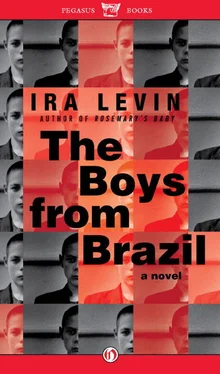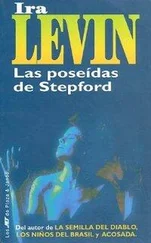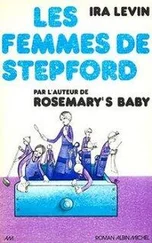“Yes, he’s at Heidelberg tonight.” Esther switched on the lamp and turned her phone index. “In Mannheim, actually. I’ve got the number right here.”
“Tomorrow he’ll be back in Vienna?”
“No, he’s going to Washington from there.”
“Oh? Well, perhaps I ought to call him in Washington. I’m a little…shaken up right now, as you can imagine, but I’ll be home tomorrow and able to talk more easily. Where will he be staying?”
“At the Benjamin Franklin Hotel.” She turned the index. “I have that number too.” She found it and read it off slowly and clearly.
“Thank you. What time is he due there?”
“His plane lands at six-thirty, God willing; he should be at the hotel by seven or seven-thirty. Tomorrow night.”
“Is he going there about this business Barry was investigating?”
“Yes,” Esther said. “Barry was right , Herr Koehler. A lot of men have been murdered, but Yakov’s going to put a stop to it. You can rest assured that your son didn’t die in vain.”
“It’s good to hear that, Fräulein Zimmer. Thank you.”
“Don’t mention it. Good-by.”
She hung up, sighed, and shook her head sadly.
Mengele hung up too, picked up his brown canvas suitcase, and got on the shorter of the two lines at the Pan Am ticket counter. He had brown hair combed to the side and a full brown mustache, and was wearing a high padded neck-brace. So far it seemed to be doing its job of making people avoid his eyes.
According to his Paraguayan passport he was Ramón Aschheim y Negrín, a comerciante en antigüedades , a dealer in antiquities; which was why he had a gun in his suitcase, a nine-millimeter Browning Hi-Power Automatic. He had a permit for it, as well as a driver’s license, a full complement of social and business credentials, and in his passport, page after page of visas. Señor Aschheim y Negrín was setting off on a multinational buying trip: the States, Canada, England, Holland, Norway, Sweden, Denmark, Germany, and Austria. He was well supplied with money (and diamonds). His visas, like his passport, had been issued in December, but they were still valid.
He bought a ticket for New York on the next flight out, leaving at 7:45, which in conjunction with an American Airlines flight would get him into Washington at 10:35 the next morning.
Plenty of time to get settled in at the Benjamin Franklin.
THE PROFESSOR OF BIOLOGY—whose name was Nürnberger and who, behind his close-trimmed brown beard and gold-rimmed glasses, looked to be no more than thirty-two or -three—bent back his pinky as if to snap it off and present it. “Identical appearance,” he said, and bent back his next finger. “Similarity of interests and attitudes, probably to a greater degree than you’re presently aware.” He bent back his next finger. “ The placement with similar families: this is the giveaway. You put these together and there’s only one possible explanation.” He folded his hands on his crossed legs and leaned forward confidingly. “Mononuclear reproduction,” he told Liebermann. “Dr. Mengele was apparently a good ten years ahead of the field.”
“It’s not surprising,” Lena said, shaking a small bottle in the kitchen doorway, “since he was doing research at Auschwitz, in the forties.”
“Yes,” Nürnberger agreed (while Liebermann tried to get over the shock of hearing “research” and “Auschwitz” in one sentence; forgive her, she’s young and Swedish, what could she know?). “The others,” Nürnberger was saying, “English and Americans for the most part, didn’t begin until the fifties and still haven’t worked with human ova. Or so they say; you can bet they’ve done more than they admit. That’s why I say Mengele was only ten years ahead rather than fifteen or twenty.”
Liebermann looked at Klaus, sitting at his left, to see if he knew what Nürnberger was talking about. Klaus chewed, examining a stub of carrot-stick. His eyes met Liebermann’s and looked a you see? at him. Liebermann shook his head.
“And the Russians, of course,” Nürnberger said, rocking back comfortably on his campstool, cupping a knee with interlaced fingers, “are probably even farther along, with no church and public opinion to contend with. They probably have a whole school of perfect little Vanyas somewhere in Siberia; even older, perhaps, than these boys of Mengele’s.”
“Excuse me,” Liebermann said, “but I don’t understand what you’re talking about.”
Nürnberger looked surprised. Patiently he said, “Mononuclear reproduction. The breeding of genetically identical copies of an individual organism. Have you studied any biology at all?”
“A little,” Liebermann said. “About forty-five years ago.”
Nürnberger smiled a young man’s smile. “That’s just when the possibility of it was first recognized,” he said. “By Haldane, the English biologist. He called it cloning , from a Greek word meaning ‘a cutting,’ as from a plant. ‘Mononuclear reproduction’ is a far more explicit term. Why coin a new word when the old ones convey more?”
“ Cloning is shorter,” Klaus said.
“Yes,” Nürnberger conceded, “but isn’t it better to use a few more syllables and say exactly what you mean?”
Liebermann said, “Tell me about ‘mononuclear reproduction.’ But bear in mind please that I studied biology only because I had to; my real interest was music.”
“Try singing it,” Klaus suggested to Nürnberger.
“It wouldn’t make much of a song if I could,” Nürnberger said. “Not a pretty love song like ordinary reproduction. There we have an ovum, or egg cell, and a sperm cell, each with a nucleus containing twenty-three chromosomes, the filaments on which the genes, hundreds of thousands of them, are strung like beads. The two nuclei merge, and we have a fertilized egg cell, forty-six chromosomes. I’m speaking now of human cells; the number is different in different species. The chromosomes duplicate themselves, duplicating each of their genes —it really is miraculous, isn’t it?—and the cell divides, one set of identical chromosomes going into each resulting cell. This duplication and division occurs again and again—”
“Mitosis,” Liebermann said.
“Yes.”
“The things that stay in the mind!”
“And in nine months,” Nürnberger said, “we have the billions of cells of the complete organism. They’ve evolved to perform different functions—to become bone or flesh or blood or hair; to respond to light or heat or sweetness, and so on—but each of those cells, each of the billions of cells that constitute the body, contains in its nucleus exact duplicates of an original set of forty-six chromosomes, half from the mother, half from the father: a mix that, except in the case of identical twins, is absolutely unique—the blueprint, as it were, of an absolutely unique individual. The only exceptions to the forty-six-chromosomes rule are the sex cells, sperm and ova, which have twenty-three, so that they can merge, fulfill each other, and begin a new organism.”
Liebermann said, “So far it’s clear.”
Nürnberger leaned forward. “That,” he said, “is ordinary reproduction as it occurs in nature. Now we go into the laboratory. In mononuclear reproduction, the nucleus of an egg cell is destroyed, leaving the body of the cell unharmed. This is done by radiation and is, of course, microsurgery of the most sophisticated order. Into the enucleated egg cell is put the nucleus of a body cell of the organism to be reproduced —the nucleus of a body cell, not a sex cell. We now have exactly what we had at this point in natural reproduction: an egg cell with forty-six chromosomes in its nucleus; a fertilized egg cell which, in a nutrient solution, proceeds to duplicate and divide. When it reaches the sixteen- or thirty-two-cell stage—this takes four or five days—it can be implanted in the uterus of its ‘mother’ who isn’t its mother at all, biologically speaking. She supplied an egg cell, and now she’s supplying a proper environment for the embryo’s growth, but she’s given it nothing of her own genetic endowment. The child, when it’s born, has neither father nor mother, only a donor—the giver of the nucleus—of whom it’s an exact genetic duplicate. Its chromosomes and genes are identical to the donor’s. Instead of a new and unique individual, we have an existing one repeated.”
Читать дальше











